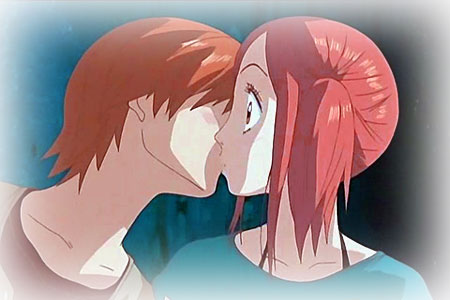Ask John: Why Do Anime Schoolgirls Fall in Love So Easily?

Question:
Why is love such a big thing in anime? I know that anime and manga reflects Japanese culture, but when a female character is introduced, she automatically falls in love with the male lead (within the realm of school harem and a few other choice genres). They seem so sure that what they feel is genuine love, but they are, for the most part, just high schoolers who don’t really have a full grasp on life yet because they always suffer through those stupid high school drama. Are they that mature at a young age? I don’t want to sound simple-minded and I certainly don’t mean to offend, but this kinda makes it seem like Japanese girls are easy and everything will come easy to them if the just wish it. I don’t want to make it sound like the American media that supposedly reflects American culture is perfect, but it just bothers me. I don’t want to solely understand a culture just by watching its cartoons, but it’s just weird to me. Hopefully you can help me understand.
Answer:
While your question seems simple, at first, it has several nuances which need to be addressed. Your question does imply your understanding that pop culture entertainment reflections of a society are not necessarily a strictly realistic representation of reality. That’s especially true in the case of anime. While many anime do reflect the realities of modern Japanese life more accurately than American cartoons reflect everyday American life, foreign observers must be careful not to assume that anime is a mirror image of Japanese life.
Anime envisions an idealized version of Japanese life. Popular titles like The Melancholy of Suzumiya Haruhi and Lucky Star present everyday Japan the way Japanese children and young adults wish it was. Anime like Code Geass and Innocent Venus depict the nightmarish version of Japan that its residents imagine as its worst case future. And romantic anime such as Itazura na Kiss or Lovely Complex, in which schoolgirls swoon over handsome young men or the new transfer student depict an idealized, hopeful but imaginary school that could exist just around the corner or in a neighboring city.
Love, of course, is a popular topic in all forms of entertainment media, anime notwithstanding. Pop music is filled with love songs. Romantic novels and poetry abound. And love is a popular theme in cinema. Love is especially appropriate for anime for two reasons: it provides hope and encouragement to viewers, and it creates empathy with the tumultuous emotions that teen anime viewers themselves face in their own lives. Japanese schoolgirls are no more or less free with their affections than any other similar girls anywhere else in the world. Teens are naturally prone to intense emotions and attachments because of puberty. Anime simply emphasizes and empathizes with that natural occurrence. Young viewers, who make up the majority of the viewers watching schoolyard romance anime, gain reassurance that their feelings are natural and normal when they can relate their feelings to others – even if those peers are fictional characters. American school life comedies and dramas like Saved By the Bell and Beverly Hills 90210 were successful because, despite being exaggerated, they still allowed American teens to see that emotional and relationship problems weren’t just limited to themselves.
Seeing schoolgirl anime characters fall in and out of love so easily and so deeply is funny. And it’s also emotionally cathartic for young viewers who can empathize with crushes, unrequited adoration, and anxieties about love. Anime is an exaggeration. Especially hardcore anime fans may become so familiar with anime, and so used to it, that we accept anime as second nature and forget that anime doesn’t depict life as it is, but rather as the way artists wish to present it. Even “realistic” anime series about daily school life, like Hitohira or Da Capo KimiKiss, as still highly stylized and subtly exaggerated. Foreigners can intuit certain characteristics of Japanese society and culture through anime, but at all times we must remember that anime, even slice-of-life anime, is dramatized fiction; not a magnifying glass on real Japanese life.
Add a Comment
You must be logged in to post a comment.


It might be for the best if you use another example rather than Da Capo (henceforth D.C.), since magic plays a fairly dominant role in the world of D.C. Sakura, for example, bloom year-round on Hatsunejima. Many characters have magical powers or abilities and at least two characters from the franchise are robots. All in all, there is quite a bit of abnormality in D.C.
If you’re looking for a realistic romance show for males, KimiKiss would be a good choice.
Point taken, and applied.
well…imagine that you were a schoolgirl and your best friend was a really hot guy. Wouldnt you “fall in love” too? maybe not… but still. anyway has anyone heard about inuyasha yet? i loved that show but the end kinda sucked.
Kimikiss is a really good example